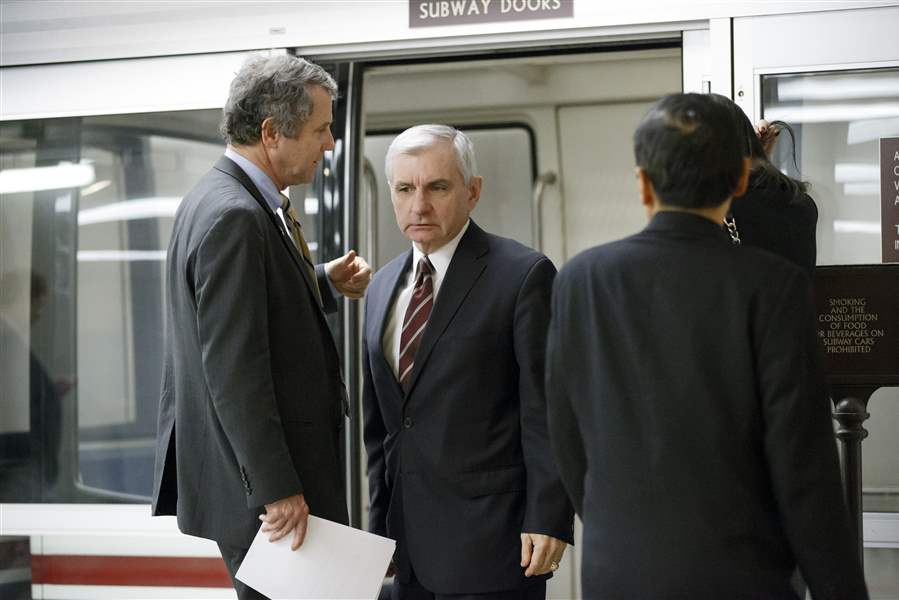
Unemployment benefits bill clears Senate hurdle
1/7/2014
Sen. Jack Reed, D-R.I., right, and Sen. Sherrod Brown, D-Ohio, left, confer before a procedural vote in the Senate on a bill that would extend unemployment benefits, at the Capitol in Washington, Monday, Jan. 6, 2014. Benefits expired for many long-term unemployed Americans on Dec. 28 after lawmakers did not extend the program as part of a bipartisan budget agreement. Sen. Jack Reed, D-R.I., is leading the effort to reauthorize the benefits for three months nationwide, but Republicans are balking however have balked at the proposed extension without offsets for the $6.5 billion that it will cost. (AP Photo/J. Scott Applewhite)
ASSOCIATED PRESS

Senate Minority Whip John Cornyn, R-Texas, walks to the Senate through an underground tunnel on the way to a scheduled procedural vote in the Senate on a bill that would extend unemployment benefits, at the Capitol in Washington, Monday.
WASHINGTON —White House-backed Legislation to renew jobless benefits for the long-term unemployed unexpectedly cleared an initial Senate hurdle today, but the bill’s fate remained in doubt.
The vote was 60-37 to limit debate on the legislation, with a half-dozen Republicans siding with the Democrats on the test vote.
At the same time, Senate Republican Leader Mitch McConnell of Kentucky said he and his rank and file would seek changes so the bill’s $6.4 billion cost would not add to deficits — a step that Senate Democrats have so far rejected. Among them is a suspension in the requirement to purchase health insurance under “Obamacare,” a step that would potentially save billions of dollars in federal subsidies to the lower-income.
As drafted, the unemployment bill would restore between 14 weeks and 47 weeks of benefits averaging $256 weekly to an estimated 1.3 million long-term jobless who were affected when the program expired Dec. 28. Without action by Congress, thousands more each week would feel the impact as their state-funded benefits expire, generally after 26 weeks.
The vote came at the dawn of an election year in which the two parties have made it clear they intend to battle for the support of millions of voters who have suffered economically through the worst recession in decades and the slow, plodding recovery that followed.
The political phrase is income disparity — the difference between the rich and the economically squeezed. In pocketbook terms, Democrats chose first to seek an extension of long-term jobless benefits, to be followed by a proposal to increase the minimum wage that many Republicans also are expected to oppose.
In remarks on the Senate floor, Senate Majority Leader Harry Reid of Nevada noted that a recent spate of positive economic news doesn’t “match the darker reality” of the lives of millions. “They sit at the kitchen table, if they’re lucky and have a kitchen table to sit. They’re juggling bills.”
McConnell countered: “Yes, we should work on solutions to support those who are out of work through no fault of their own.
“But there is no excuse to pass unemployment insurance legislation without also finding ways to create good, stable, high-paying jobs - and also trying to find the money to pay for it. So what I’m saying is, let’s support meaningful job creation measures, and let’s find a way to pay for these ...benefits so we’re not adding to an already unsustainable debt.”
The six Republicans who sided with Democrats on the vote included Dean Heller of Nevada, Kelly Ayotte of New Hampshire, Dan Coats of Indiana, Susan Collins of Maine, Lisa Murkowski of Alaska and Rob Portman of Ohio.
The three-month measure is the leading edge of a Democratic program that also includes raising the minimum wage and closing tax loopholes on the wealthy and corporations. The Democratic agenda also includes measures designed to demonstrate sympathy with those who suffered during the worst recession in decades and a subsequent long, slow recovery.
With bad weather preventing more than a dozen senators from traveling to Washington on Monday evening, a showdown vote was postponed until today.
But not before Republicans accused Democrats of playing politics.
“It is transparent that this is a political exercise, not a real effort to try to fix the problem,” Sen. John Cornyn, R-Texas, said in a protest followed immediately by Majority Leader Harry Reid’s agreement to delay the vote.
Two influential outside organizations opposed the bill, including Heritage Action, which called the program of extended unemployment benefits “ineffective and wasteful.”
At issue was a complicated system that provides as much as 47 weeks of federally-funded benefits, which begin after state benefits, usually 26 weeks in duration, are exhausted.
The first tier of additional benefits is 14 weeks and generally available to all who have used up their state benefits.
An additional 14 weeks is available to the unemployed in states where unemployment is 6 percent or higher. Nine more weeks of benefits are available in states with joblessness of 7 percent or higher. In states where unemployment is 9 percent or higher, another 10 weeks of benefits are available.